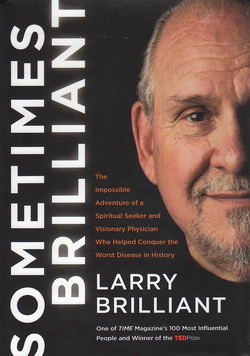‘Sometimes Brilliant’
The impossible adventure of a spiritual seeker and visionary physician who helped conquer the worst disease in history. Kaiyum reviews Larry Brilliant’s autobiographical book.
A brilliant title, followed on the second page of the book by the words:
(Sometimes Not So)
 This highly readable book will keep the average reader busy for a few days: the 420 odd pages are truly necessary to cover the numerous themes that, like the weft and warp of textile, illustrate the fascinating life events and career of this remarkable man.
This highly readable book will keep the average reader busy for a few days: the 420 odd pages are truly necessary to cover the numerous themes that, like the weft and warp of textile, illustrate the fascinating life events and career of this remarkable man.
What soon becomes clear is that the basic fabric of Larry’s life involves his spiritual growth and, notably, his dedication to Maharaji (Neem Karoli Baba).
As the story unfolds, the subtitle also becomes clearer, as a delightful tongue-in-cheek indication of how he often got in his own way!
Maharaji’s magic
The following somewhat mysterious quotation lies at the heart of the ‘how and why’ of Larry’s work in eradicating smallpox in India:
“I don’t know how I got into this, and I don’t know why we’re doing it, but my team in India wants to hire this young American doctor who has been living in an ashram in the mountains of India. They want to bring him on as a secretary and as a local hire, not a medical officer. We’ve never done anything like this before. But the kid was a hippie and war protestor and probably won’t get loyalty clearance, or at least the background check will take too long.”
These words are spoken by Dr. D.A. Henderson of WHO headquarters in Geneva, in conversation with the US Surgeon General at the same time that Larry was spelling Henderson’s name to Maharaji in the Kainchi ashram…
Maharaji is well known for his ability to transcend time and distance in order to influence events. Time after time he foretells Larry’s future and how important his task is:
“You will go to work for the United Nations. God is going to give humanity a gift. The terrible disease, smallpox, will be pulled out by the roots. You will see. You will see.”
And the reader is granted many insights into how Larry struggles with his own thoughts and convictions until finally relinquishing them and devoting himself to his guru.
Smallpox
Some two-thirds of the book is concerned with the task of disease control. Besides Larry’s increasing involvement in the programme, there is a thorough description of the organisational and above all political complexities and every possible setback imaginable where egos and power-play are involved. The range of anecdotes is vast and fascinating. A particularly striking set of stories concerns the Sherlock Holmes-like investigation into the source of an outbreak. This leads to the ultimate highly effective and unselfish involvement of the Tata company in containing the spread of smallpox. How Larry effected this is just one of the many exciting tales that makes this book ‘a good read’.
Search
Larry’s beloved Elaine – later Girija – soon becomes his wife and gradually gets him involved in the scene around Maharaji. His unwillingness and resistance is described in all candidness:
“The ashram was already too weird, too pagan. I just wanted things to be the way they had been. I wanted my wife back. I wanted to know whether this guru was a fake or a saint; whether my wife and her new friends were on to something, had found God, or had gone nuts.”
Larry treats us to a thorough account of his Jewish background (including bar mitzvah), his involvement with cult personalities like Wavy Gravy and the Hog Farm Family, and equally famous figures such as Martin Luther King and Ram Dass, and events such as the Native American takeover of Alcatraz with all its interesting ramifications.
Power
One of the themes in this autobiography is summed up by Larry when he quotes Margaret Mead:
“Never doubt that a small group of thoughtful, committed citizens can change the world. Indeed, it is the only thing that ever has.”
And the rest of the book is, in a sense, just the packaging of how Larry came to be one such ‘thoughtful, committed citizen’.
Presentation
For such a thick book it’s remarkably light (easy to hold!) and with a highly agreeable design, a comfortable combination of paper colour, typeface and lay-out. It is well-edited and virtually devoid of errors. An easy read, with a wide vocabulary, but in no way ‘academic’.
The story is richly enhanced by a large collection of interesting, historical photographs, some of which are definite ‘gems’!
Read an excerpt
I did not expect to be long
Available on amazon.com – amazon.co.uk – amazon.de – amazon.in
Kaiyum is a regular contributor
All articles by this author published on Osho News
- Log in to post comments
- 59 views
